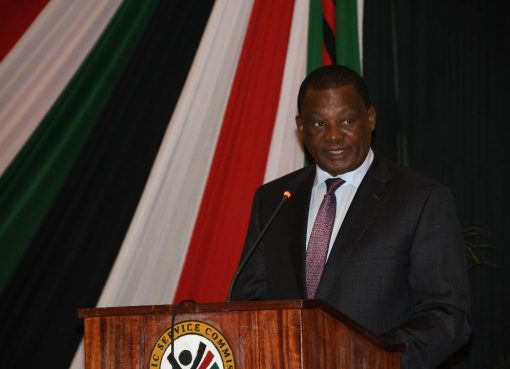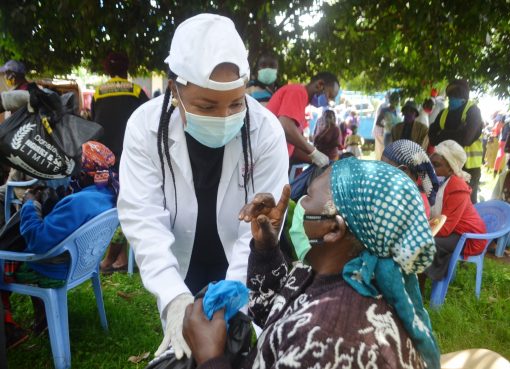Over 40,000 residents of Bartabwa location in Baringo have a reason to smile following a life transforming project undertaken by World Vision.
The project that was aimed at child safety and sanitation has had multi-pronged ripple benefits that has greatly improved the lives of remote villages in Baringo North Sub-County.
When the non- profit organization pumped Sh. 24 million in a two years old Moigutwo Day Secondary School in 2013, it never crossed their minds that their intention to protect girls would propel the school to current status.
The new entity that started with a mere eight students now has a student population of close to 300 students thanks to the 180-bed dormitory facility, two science laboratories and 4 classrooms put up by the organization.
The Cabinet Secretary for Labour and Social Protection Simon Chelugui who toured the projects on lauded the project and promised government’s support to work with the organizations and other likeminded actors to protect the rights of the children.
“All of us will work hard to protect rights of the children and prevent any abuse or misuse of children in this country,” assured the CS.
According to the school principal Mr. Paul Biwott Yano, the gesture has turned around the challenges and hardships in the area and has made the school a centre of choice attracting students from as far as Nakuru and Eldoret.
“We only have two schools in the entire ward and both are between eight and ten kilometres from here, so children were exposed to risks while travelling those long distances, and they could lead to dropping out of school due to early pregnancies,” said Mr. Yano.

Retrogressive practices like FGM and early marriages also prevented girls from accessing right to education.
“Child labour was practiced with girls being exported to major urban centres to work as house helps while boys were crossing over to Elgeyo Marakwet to work as farmhands,” explained the teacher.
He says that the upgrade of the school and sensitization done by World Vision on importance of education has turned the tables around and given the children the comfort to concentrate with their studies.
Water projects near the school has meant that child protection is improved as they don’t have to go far looking for water.
“Our children now can compete with those in other areas due to the improvement in the school, some that had even dropped out of school sired school have had the chance to go back to school and study, one with two kids is set to join the university after meeting the university cut off points,” said James Kipkiror, a parent at the school.
Another school that has benefitted from the programme is Atiar Mixed Day Primary School. The organisation equipped a borehole drilled by Rift Valley Water Services Board with solar powered pump and distributed it not only to the school but also 300 households in the area.
According to the institution’s head Kiptum Thomas water challenges interfered with normal learning as children had to get out of school to fetch water from seasonal streams. The day scholars missed or delayed reporting to school as their time was taken up by the task of fetching water.
“Due to access of water the pupils are able to concentrate on what brought them to the school, the cases of waterborne diseases are almost unheard off and we have also seen a marked improvement in academic performance,” said the head teacher of the school in one of the remote parts of Baringo.
The two schools have also been a safe refuge to children from the nearby villages affected by rampant cattle rustling.
A resident, Rose Kibarendo, shows us the dirty water in a seasonal stream that served the villagers and school with the farthest ones walking over 5 kilometres to queue for the precious commodity.
She acknowledges that indeed the village suffered waterborne diseases often due to the untreated water and that they also lost their children who accidentally fell on the stream in times of heavy downpour.
“Our children missed school days as they would get late to school due to long queues at the river, but this project has brought water to our doorsteps through pipes,” sad the jubilant resident.
Alexon Mwasi, World Vision Cluster Manager for Baringo and Nakuru Counties says the organization goal was to protect vulnerable children through provision of water and safe boarding facility.
“We were targeting to supply water to schools and health facilities but went a step further and did last mile connectivity to 300 households, supported by three 50 cubic metres tanks and pipes,” added Mwasi.
The manager adds that they have assisted multiplying the project in other villages and they have already drilled eight boreholes.
He adds that an incidental benefit of nutritional benefit where women are able to use the water to do Kitchen garden and get vegetables for their families.
“We have also managed to make 80 out of 89 villages in the area of operation to be open defecation-free area through assisting households to build toilet facilities,” says Mwasi.
The organization has partnered with the national government through the ministries of Interior and Labour and Social Protection in achieving their goals.
The CS was accompanied by World Vision Country Director Lilian Dodzo, Plan international Director Kate Maina-Vorley, Baringo Governor Stanley Kiptis, County Commissioner Henry Wafula and other stakeholders in children matters.
By Christopher Kiprop





